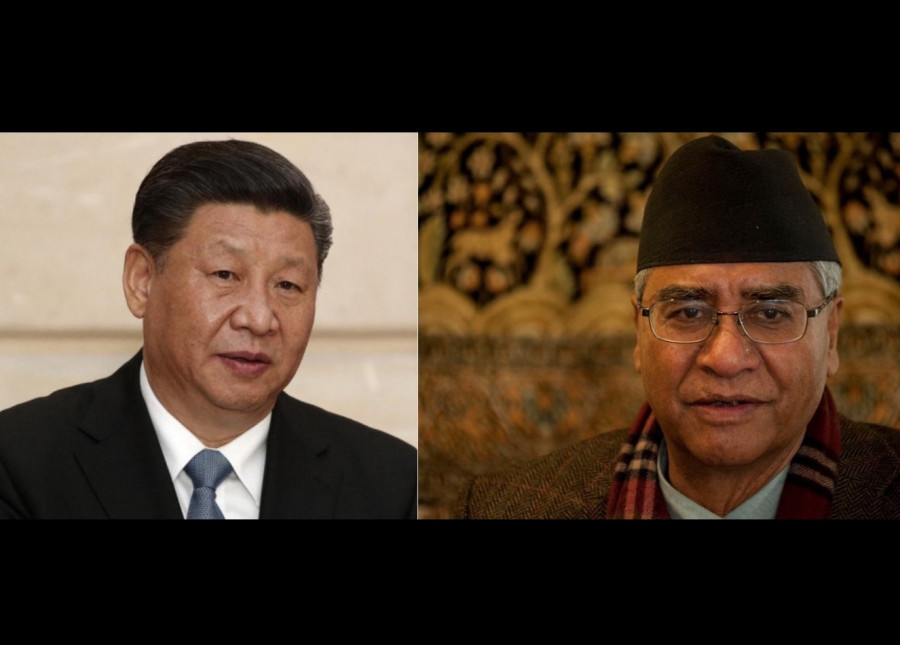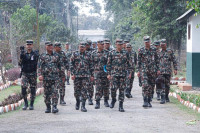National
US interest, Nepal foreign policy under Beijing’s watch with changes in Kathmandu
China would want to make a push for implementation of BRI projects, just as Deuba government prepares to move the American MCC programme forward, observers say.
Anil Giri
A day after Prime Minister Sher Bahadur Deuba won the vote of confidence in the House, Global Times, the mouthpiece of the Chinese Communist Party, ran an opinion piece branding him “a pro-India leader”.
The paper, which often takes the party line, also took note of American Ambassador Randy Berry and Indian Ambassador Vinay Mohan Kwatra extending congratulations to Deuba, saying “their eagerness to promote ties with the new prime minister is quite obvious”.
“Kwatra even visited the residence of Deuba on July 14 to congratulate him,” it added. It, however, made no mention of Chinese Ambassador Hou Yanqi paying a courtesy call on the newly-appointed prime minister.
“Meeting with @PRCAmbNepal at Baluwatar today. I look forward to building a stronger relationship with China,” Deuba wrote on Twitter.
The Chinese reaction may have been sharp, but many in Nepali political and diplomatic circles say as Deuba has proclaimed his foreign policy will be guided by mutual friendship and cooperation, the ties with the north will not see any upheavals.
On July 18, the day Deuba went for a floor test in Parliament, he said that his foreign policy will be guided by national interests. He said his foreign policy priorities will begin with neighbouring countries and then go on to include the region, the major powers like the United States, Europe and others.
“There are no permanent friends and enemies in foreign policy and international relations but there is always a permanent interest,” said Deuba. “Securing vaccines will be my first and foremost foreign policy priority.”
Minutes after the result of the vote of confidence was announced, Indian Prime Minister Narendra Modi congratulated Deuba.
Experts say it would be wrong to say that Beijing is wary of the government change in Nepal but it does have some concerns and will keep a watchful eye on Nepal. And it would be more so because of the United States rather than India.
“The presence of the Communist Party of Nepal (Maoist Centre) as Deuba’s coalition partner will help the ties remain balanced,” said a senior Nepali Congress leader who did not wish to be named. “China still sees the Maoist Centre as a friendly force.”
What will be of more interest for China is how Deuba takes the Millennium Challenge Corporation compact forward. Deuba over the years has pushed for an early ratification of the US programme under which Nepal is set to receive $500 million in grants. However, parliamentary ratification is pending.
Beijing perceives the MCC compact as part of the US Indo-Pacific Strategy aimed at countervailing its own Belt and Road Initiative, which Nepal signed up to in May 2017.
On Tuesday evening, just before landing in India, US Secretary of State Antony Blinken rang Deuba up and discussed a wide range of issues, including the MCC.
“The conversation also covered various areas of Nepal’s development priorities, the United States’ cooperation and the MCC,” read a Foreign Ministry statement.
Deuba has publicly committed to ratifying the MCC from Parliament and the ruling alliance is discussing the matter. However, the Maoist Centre has in the past made its position against the US programme, and in this context, China will be watching the developments in Nepal more keenly, experts say.
“Definitely, our ties with China will be based on necessity and needs; not on the basis of principles and ideologies, like the previous government did,” said Narayan Khadka, who looks after foreign affairs issues in the Nepali Congress. “But it must be noted that we [the Nepali Congress] never have had bad relations with China.”
The Chinese, however, had huge expectations from the erstwhile Oli government. Beijing is said to have engineered the unity between Oli’s CPN-UML and Pushpa Kamal Dahal’s Maoist Centre. The two parties had merged in May 2018 to form the Nepal Communist Party (NCP).
It was during Oli’s tenure that Xi Jinping visited Kathmandu in October, 2019, becoming the first Chinese president in 23 years to arrive in Nepal.
After an intense infighting threatened the party unity, there was a flurry of visits from the north, just as the Chinese ambassador called on several communist leaders in Kathmandu.
The Nepal Communist Party (NCP), however, was invalidated by the Supreme Court on March 7, by when Oli’s tilt towards Delhi had already become apparent, especially after his clandestine meeting with Samant Kumar Goel, the chief of India’s spy agency Research and Analysis Wing in October last year.
Khadka said the Deuba government will maintain a pragmatic approach when it comes to its ties with China.
“That there is rivalry when it comes to China, India and the United States is a given, but it does not mean we have to be hostile towards Beijing,” Khadka told the Post.
While the MCC is a hotly debated issue in Nepal, with its ratification more likely during Deuba’s tenure, the progress of projects under China’s BRI has been sluggish.
When Nepal signed up to the BRI in May 2017, Dahal was the prime minister and Congress party’s Prakash Sharan Mahat the foreign minister. Four years later, Deuba, a Congress party leader, is now the prime minister with Dahal as his coalition partner.
Observers say Beijing would want to make a push for the implementation of BRI projects in Nepal just as Kathmandu prepares to move the MCC forward.
“The erstwhile Oli government failed to meet Beijing’s expectations. So I don’t think China is looking forward to anything except engaging with the new regime in Kathmandu,” said Rupak Sapkota, deputy executive director at the Institute of Foreign Affairs.
“But given the Congress party’s historical relations with China, the Maoist Centre’s participation in the government, and Deuba’s statement in Parliament about his idea of conducting the foreign policy, ties between Kathmandu and Beijing are likely to be stable.”
According to Sapkota, Beijing is keeping an eye on who becomes the foreign minister and what kind of foreign policy approach the Deuba government will pursue.
“The MCC and BRI and how the Deuba government responds to the past agreements and accords will define the ties in the future,” said Sapkota, who holds a PhD in international relations from China’s Fudan University. “The Maoist Centre as a coalition partner, however, definitely makes Beijing confident about the Congress regime in Kathmandu.”
Though the Nepali Congress has maintained good relations with China historically, two incidents in the recent past had made Beijing suspicious.
In 2016, when Deuba shared a podium with a Tibetan leader in Goa, India, the Chinese had expressed their displeasure. In November last year, the Chinese Embassy wrote to the Nepali Congress after its provincial lawmaker Jeevan Bahadur Shahi visited a “disputed territory” and reported to the government that China encroached upon Nepali land in Humla.
“This was probably the first time China had directly written to any political party of Nepal, in an undiplomatic exercise,” said a Nepali official familiar with the matter. “The issue, however, died down quickly and the Chinese started engaging with Congress leaders as well.”
Guo Yezhou, vice-minister of the International Department of the Communist Party of China, during his visit to Kathmandu in December-end last year, on the heels of the first House dissolution by Oli, had called on Deuba. Guo also extended an invitation to Deuba to participate in a programme marking 100 years of the founding of the Chinese Communist Party on July 1.
“The Chinese maintain relations with the state, hence whoever comes to power in Kathmandu, they try to engage with them,” said Sundar Nath Bhattarai, executive director at China Study Centre. “They have already sent a signal that they are ready to work with the Deuba government.”
During her courtesy call on Deuba on July 16, Chinese Ambassador Hou discussed vaccine cooperation. Subsequently, Beijing announced an additional 1.6 million doses of Covid-19 vaccine to Nepal.
“Some may say Nepal-China relations will be affected due to strategic ties between the US and India and the recent visit of Chinese President Xi to Tibet,” said Bhattarai. “But our relations with both neighbours are based on trust and merit.”
The Global Times opinion author, Zhang Jiadong, despite calling Deuba a pro-India leader, said that “China-Nepal ties [are] solid.”
“For China, it is more important to deepen its understanding of Nepal's foreign policy than to focus on the changes in the leadership and ruling party,” wrote Zhang, professor at the Center for American Studies, Fudan University.
“The establishment of a new diplomatic system with multiple subjects, forms and dimensions is not only necessary for the development of China's relations with Nepal, but also for China's diplomatic reform in the new era.”
On Tuesday, 15 days after Deuba’s appointment, Chinese Prime Minister Li Keqiang sent a congratulatory message.
In his message, Li said China and Nepal are friendly neighbours linked by mountains and rivers and standing closely together like passengers in the same boat, according to Xinhua, China’s national news agency.
“Li added that he would like to work with Deuba to overcome the challenges of the Covid-19 pandemic, promote high-quality Belt and Road cooperation, expand and deepen mutually beneficial cooperation in various fields, and continuously lift the two countries' strategic partnership of cooperation, featuring ever-lasting friendship for development and prosperity, to higher levels,” Xinhua reported.




 8.44°C Kathmandu
8.44°C Kathmandu














